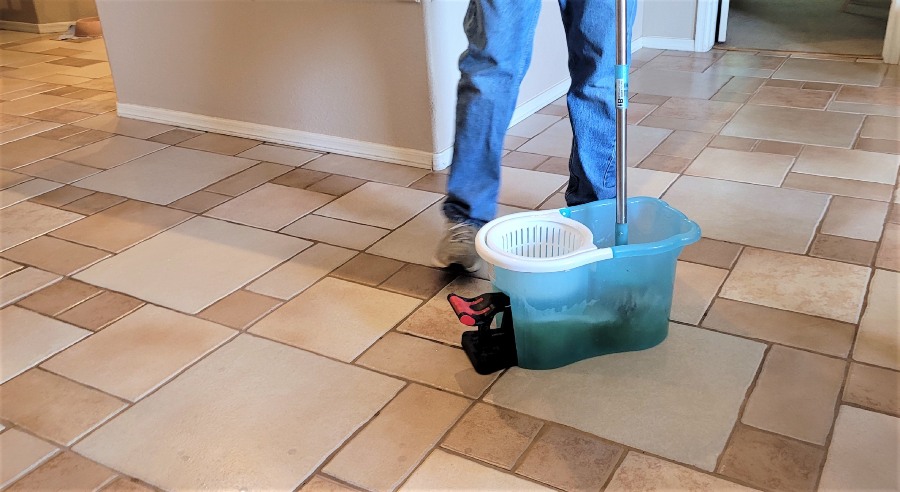Why should you stop using a mop and a bucket for your industrial floor cleaning? Continue reading to learn more.
Grabbing a mop and a bucket for your industrial floor cleaning routine can be tempting, but it may not be nearly as effective as you think – and we are not even mentioning the potential safety hazards yet.
From time wastage to hygiene concerns, there are multiple reasons why outdated cleaning techniques should no longer be the norm – in this article, we will give you 9 reasons to stop using a mop and a bucker for your industrial floor cleaning needs – and why you should hire professional services instead.
1. Quality of cleaning
The first reason why you need to stop using traditional cleaning techniques, and leave it to the professionals instead, is the quality of cleaning. Companies specialized in industrial floor cleaning, such as TCS Floors, have access to advanced cleaning technologies that can provide a deeper and more thorough clean than manual methods.
Examples of specialized equipment include, but are not limited to scrubbers, buffers, and extractors that go beyond the capabilities of a traditional mop and bucket.
This equipment is not only much more efficient at removing dirt, stains and debris from various services, but also ensures that you are meeting the standards of cleanliness such as the ISSA, as well as the UL Standards for Slip Resistance Coefficients.
Of course, keep in mind that not all companies are capable of meeting all standards – so, if you want to make sure that you do, TCS Floors is the right choice for your industrial floor cleaning needs.
2. Health and safety
Another reason to stop using a mop and a bucket for industrial floor cleaning is because it helps you meet the safety standards. It also gives you peace of mind knowing that you significantly reduce the risks of slip and fall for everyone in the workplace, as well as possible lawsuits.
Here’s how:
- Use of safe cleaning agents – companies like TCS Floors prioritize the use of cleaning agents that are safe for both the environment and human health. This includes cleaning solutions that don’t introduce harmful chemicals into the workplace.
- Reduced slip and fall risks – when you are doing the cleaning yourself, you may not be using the proper cleaning methods and equipment to remove the slippery substances and residues from floors. For this reason, hiring professional services is essential for promoting a safer working environment.
- Compliance with regulations – professional industrial floor cleaning services ensure that you are meeting the industry regulations and standards related to cleaning and workplace safety.
- Prevention of mold and mildew – regular and thorough cleaning is essential for preventing the buildup of moisture, which can lead to the growth of mold and mildew. This not only protects the structural integrity of the warehouse or building, but it also contributes to better indoor air quality.
- Proper disposal of waste – the industrial floor cleaning company also ensures the proper disposal of waste generated during the cleaning process. This includes handling and disposing of cleaning materials, debris, and any hazardous waste in accordance with environmental and safety regulations.
- Better indoor air quality – the cleaning methods employed by professional services aim to remove dust, allergens, and pollutants from the indoor environment. This contributes to better indoor air quality, reducing the risk of respiratory problems and allergies among occupants.
Safety is extremely important when it comes to cleaning your industrial space – and unfortunately, a mop and a bucket is most likely not sufficient in preventing safety hazards.
3. Cost-effectiveness
Hiring professional cleaning services is highly cost-effective in the long run. On one hand, advanced equipment and techniques clean industrial floors more quickly and efficiently than traditional methods like mops and buckets – which saves time so employees can focus on more productive tasks.
On another hand, professionally cleaned and maintained industrial floors are less likely to experience extensive wear and tear. This not only preserves the quality of the flooring material and extends its lifespan, but can also lead to lower maintenance costs over time.
In addition, reducing the risk of safety hazards means that you are likely to experience fewer workplace accidents and injuries, leading to potential savings on lawsuits, workers’ compensation, and insurance costs.
4. Heavy-duty cleaning
Another reason to stop using a mop and a bucket for industrial floor cleaning is because it is often inadequate for heavy-duty cleaning where more advanced technologies and techniques are often needed.
Industrial environments often involve the presence of grease, oil, and other tough-to-remove substances. Instead of properly cleaning them, mops may actually spread these substances around, leaving behind residues and not effectively lifting the contaminants from the floor.
Professional cleaning services utilize industrial-strength cleaners and equipment specifically designed to break down and remove stubborn grease and oil.
On another hand, mops may struggle to effectively tackle deep-set stains and ingrained grime in industrial settings. Heavy machinery, constant foot traffic, and various materials can lead to deeply embedded dirt.
Industrial floor cleaning services have access to specialized tools, such as power scrubbers and pressure washers, capable of providing a deeper and more thorough clean.
5. Limited reach
It’s also important to keep in mind that mops can struggle to reach certain areas, such as:
- Corners and edges
- Under equipment and machinery
- Overhead surfaces
- Grout lines and textured surfaces
- Vertical surfaces
- Staircases and ramps
Professional cleaning services overcome these limitations by employing specialized tools and techniques to ensure a comprehensive and thorough cleaning of the entire industrial space.
6. Residual buildup
Another reason to stop using a mop and a bucket for industrial floor cleaning is residual buildup.
Mops may not always effectively remove all dirt and debris from the floor surface. Instead, they can push dirt around, and some of it may be left behind. Over time, this incomplete removal can lead to the buildup of residues, creating a layer of grime on the floor.
As the cleaning process progresses with a mop and bucket, the water in the bucket becomes progressively dirtier. If not changed regularly, the mop ends up spreading this dirty water across the floor, leaving behind residues of contaminants.
Industrial floor cleaning services often use advanced equipment with built-in systems to ensure a constant supply of clean water, preventing the spread of contaminants.
7. Surface material compatibility
Industrial facilities often have diverse flooring materials, including concrete, tile, epoxy, vinyl, or specialty coatings. Each type requires a specific cleaning approach to maintain its integrity and appearance.
Mops and buckets may not be suitable for all surfaces. For example, abrasive or harsh cleaning materials can scratch or erode certain types of flooring. Professional cleaning services assess the material of the industrial floor and use methods that are compatible, minimizing the risk of damage.
In addition, cleaning agents used with mops may not be compatible with all flooring materials. Some chemicals can react negatively with certain surfaces, leading to discoloration or deterioration.
Professional services use appropriate, industry-approved cleaning solutions that won’t harm the specific flooring material.
FAQ
How are industrial floor service rates calculated?
Industrial floor service rates are typically calculated based on factors such as the size of the facility, the type of flooring material, the level of cleaning required, and the frequency of service.
Specialized equipment, labor costs, and any additional treatments or coatings can influence pricing.
Each project is unique, and a detailed assessment is often conducted by the service provider to provide a tailored quote that reflects the specific needs and challenges of the industrial space.
You can read more on that here.
What is commercial floor cleaning?
Commercial floor cleaning involves the systematic and professional cleaning of floors in business or non-residential spaces. It encompasses various flooring materials such as tile, carpet, vinyl, and concrete.
The process includes thorough dirt and debris removal, application of appropriate cleaning agents, and often the use of specialized equipment like floor scrubbers or carpet cleaners.
What is the difference between commercial and residential floor cleaning?
The main difference between commercial and residential floor cleaning lies in scale, scope, and the nature of the spaces involved. Commercial floor cleaning typically addresses larger areas found in businesses, offices, or industrial settings, requiring specialized equipment and often scheduled routine maintenance.
In contrast, residential floor cleaning is tailored for smaller, diverse spaces within homes and focuses on individual preferences.
Commercial cleaning may involve tackling tougher stains and adhering to industry-specific regulations, while residential cleaning is often more personalized, considering specific flooring materials and lifestyle factors of individual households.




